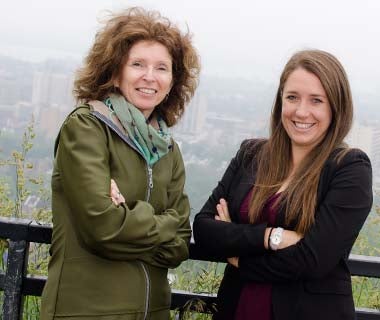
Does climate change affect your health?
Waterloo study shows most people don’t realize how pollution and extreme temperatures associated with climate change affect their health.

Waterloo study shows most people don’t realize how pollution and extreme temperatures associated with climate change affect their health.
By Christine Bezruki Applied Health SciencesMitigating climate change is about much more than saving the icecaps and rainforests— it’s about protecting our health.
 Susan Elliott, Dean of Applied Health Sciences and graduate student, Francesca Cardwell.
Susan Elliott, Dean of Applied Health Sciences and graduate student, Francesca Cardwell.
While researchers have flagged climate change as the biggest global health threat of the 21st century, a recent study by Applied Health Sciences Dean Susan Elliott, and her graduate student, Francesca Cardwell, found that most Canadians just don’t see the link. And they want to know what can be done about it.
“Most people think of climate change as an environmental issue that won’t impact their health,” said Elliott. “They see it as something that will happen 400 years down the road and very far away. But the fact is, climate change will, and already is, affecting our health.”
The missing link
The study, conducted in Ontario’s Golden Horseshoe region, an area traditionally associated with poor air quality, found that only 23 percent of participants included the environment in their definition of health.
But when asked about specific health concerns in their own communities, 73 percent of participants identified environmental issues.
“There is a real disconnect in thinking about the environment and health,” said Cardwell. “When looking at the big picture people don’t see the link, but when asked in a personal community-based context, the environment is at the top of their list. There is a missing link.”
The findings are consistent with other research that shows Canadians do not yet consider climate change a significant health risk.
Framing the issue
The key to fixing the disconnect, says Cardwell, is more consistently communicating how climate change will impact individual health— a task which presents no shortage of options.
Climate change is expected to change the range and transmission of infectious disease, cause food insecurity and reduce access to safe water. Air pollution and temperature stress are already causing health issues in Ontario.
“Framing climate change as a health issue is key to bringing the issue closer to home. Linking a complex topic to something that is already valued will increase relevance to the public and potentially encourage behaviour change,” said Elliott.
For both Elliott and Cardwell, behaviour change is at the root of their work.
“Climate change can’t be stopped unless more people engage in environmentally aware behaviours,” said Cardwell. “We are giving them a reason to care.”

Read more
How machine learning empowers collaboration between computer science, math and medical research

Read more
Dr. Heather Keller discusses the need to transform mealtimes in Canada’s long-term care homes from a service to a meaningful form of care

Read more
“I’m just like you.”
The University of Waterloo acknowledges that much of our work takes place on the traditional territory of the Neutral, Anishinaabeg, and Haudenosaunee peoples. Our main campus is situated on the Haldimand Tract, the land granted to the Six Nations that includes six miles on each side of the Grand River. Our active work toward reconciliation takes place across our campuses through research, learning, teaching, and community building, and is co-ordinated within the Office of Indigenous Relations.